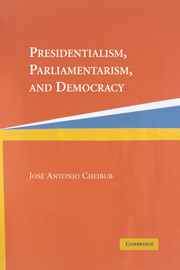Book contents
- Frontmatter
- Contents
- List of Figures and Tables
- Acknowledgments
- 1 INTRODUCTION
- 2 PRESIDENTIAL, PARLIAMENTARY, AND MIXED DEMOCRACIES
- 3 ARE THE INCENTIVES FOR COALITION FORMATION DIFFERENT IN PARLIAMENTARY AND PRESIDENTIAL DEMOCRACIES?
- 4 ARE COALITIONS RARE IN PRESIDENTIAL DEMOCRACIES?
- 5 PARTY DISCIPLINE AND FORM OF GOVERNMENT
- 6 WHAT MAKES PRESIDENTIAL DEMOCRACIES FRAGILE?
- 7 CONCLUSION
- Appendix: Definition and Sources of Variables
- References
- Index
- Cambridge Studies in Comparative Politics
6 - WHAT MAKES PRESIDENTIAL DEMOCRACIES FRAGILE?
Published online by Cambridge University Press: 05 June 2012
- Frontmatter
- Contents
- List of Figures and Tables
- Acknowledgments
- 1 INTRODUCTION
- 2 PRESIDENTIAL, PARLIAMENTARY, AND MIXED DEMOCRACIES
- 3 ARE THE INCENTIVES FOR COALITION FORMATION DIFFERENT IN PARLIAMENTARY AND PRESIDENTIAL DEMOCRACIES?
- 4 ARE COALITIONS RARE IN PRESIDENTIAL DEMOCRACIES?
- 5 PARTY DISCIPLINE AND FORM OF GOVERNMENT
- 6 WHAT MAKES PRESIDENTIAL DEMOCRACIES FRAGILE?
- 7 CONCLUSION
- Appendix: Definition and Sources of Variables
- References
- Index
- Cambridge Studies in Comparative Politics
Summary
I have argued in the previous chapters that intrinsic features of presidentialism are not the reason why presidential democracies are more prone to breakdown. Little in the chain of reasoning that leads from separation of powers to the instability of presidential regimes can be supported either theoretically or empirically. Yet the fact remains that democracies tend to have shorter lives when they are presidential. Recall that, for the 1946–2002 period, the expected life of a presidential democracy was 24 years versus 58 for parliamentary ones. Why, then, are presidential democracies more likely to die?
In this chapter I argue that the difference in the survival rates of parliamentary and presidential democracies can be accounted for by the conditions under which these democracies have existed. However, these are not the conditions that have been identified by the extant literature. Thus, I first show that the usual suspects – level of economic development, size of the country, geographic location – are not sufficient to account for the differences in survival rates across democratic systems. Although some of these conditions do matter, they do not fully eliminate these differences. I then argue that some democracies emerge in countries where the probability of a democratic breakdown is high, regardless of the type of democracy that exists, and that presidential democracies have emerged more frequently in such countries.
- Type
- Chapter
- Information
- Presidentialism, Parliamentarism, and Democracy , pp. 136 - 164Publisher: Cambridge University PressPrint publication year: 2006

